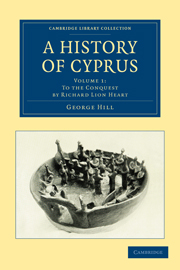Book contents
- Frontmatter
- Contents
- Preface
- List of Illustrations and Maps
- Lists of Books Consulted
- Chapter I The Land
- Chapter II The Stone Age
- Chapter III The Bronze Age
- Chapter IV The Religion of Early Cyprus
- Chapter V The Greek Colonization
- Chapter VI Phoenicians, Assyrians and Egyptians
- Chapter VII From Cyrus to Alexander
- Chapter VIII The Successors
- Chapter IX The Ptolemies
- Chapter X The Arts in Pre-Roman Cyprus
- Chapter XI The Roman Province
- Chapter XII Byzantium and Islam
- Addenda
- Index
- Plate section
Chapter X - The Arts in Pre-Roman Cyprus
Published online by Cambridge University Press: 05 November 2011
- Frontmatter
- Contents
- Preface
- List of Illustrations and Maps
- Lists of Books Consulted
- Chapter I The Land
- Chapter II The Stone Age
- Chapter III The Bronze Age
- Chapter IV The Religion of Early Cyprus
- Chapter V The Greek Colonization
- Chapter VI Phoenicians, Assyrians and Egyptians
- Chapter VII From Cyrus to Alexander
- Chapter VIII The Successors
- Chapter IX The Ptolemies
- Chapter X The Arts in Pre-Roman Cyprus
- Chapter XI The Roman Province
- Chapter XII Byzantium and Islam
- Addenda
- Index
- Plate section
Summary
The history which we have attempted so far to set forth has been an affair chiefly of drum and trumpet, punctuated with personal anecdotes of the petty courts of Cyprus. Of the intellectual or spiritual life of the island, so far as it is revealed in literature, we know practically nothing, and indeed it is impossible to say whether its literature had any special character of its own. The gallant attempt by Engel to scrape together the information available about the cultural history of the Cypriotes results—apart from his analysis of the Cypria—in little more than a list of names of second- or third-rate authors. Judging from its contents, the epic of the Cypria had little to do with Cyprus, even if its author was a Cypriote. That there was early lyric poetry in the courts of Cyprus is suggested by an allusion in Pindar's Second Pythian to songs in praise of Cinyras. Cleon of Curium wrote a poem called Argonautica, from which Apollonius Rhodius, in his epic on the same theme, was accused of borrowing; whether he was identical with the elegiac poet Cleon is not certain. The island produced no tragic writer, and only recorded one writer of comedies or burlesques, Sopater of Paphos, and he appears to have lived, at least for a time, in Alexandria. Choral and theatrical performances of course played their part in Cypriote life, especially at Salamis, whither artists flocked from the time of Euagoras I. Kings of Salamis and Soli furnished choruses at Alexander's competitions at Tyre, and inscriptions of Ptolemaic date frequently mention the guilds of Dionysiac artists.
- Type
- Chapter
- Information
- A History of Cyprus , pp. 212 - 225Publisher: Cambridge University PressPrint publication year: 2010First published in: 1940

